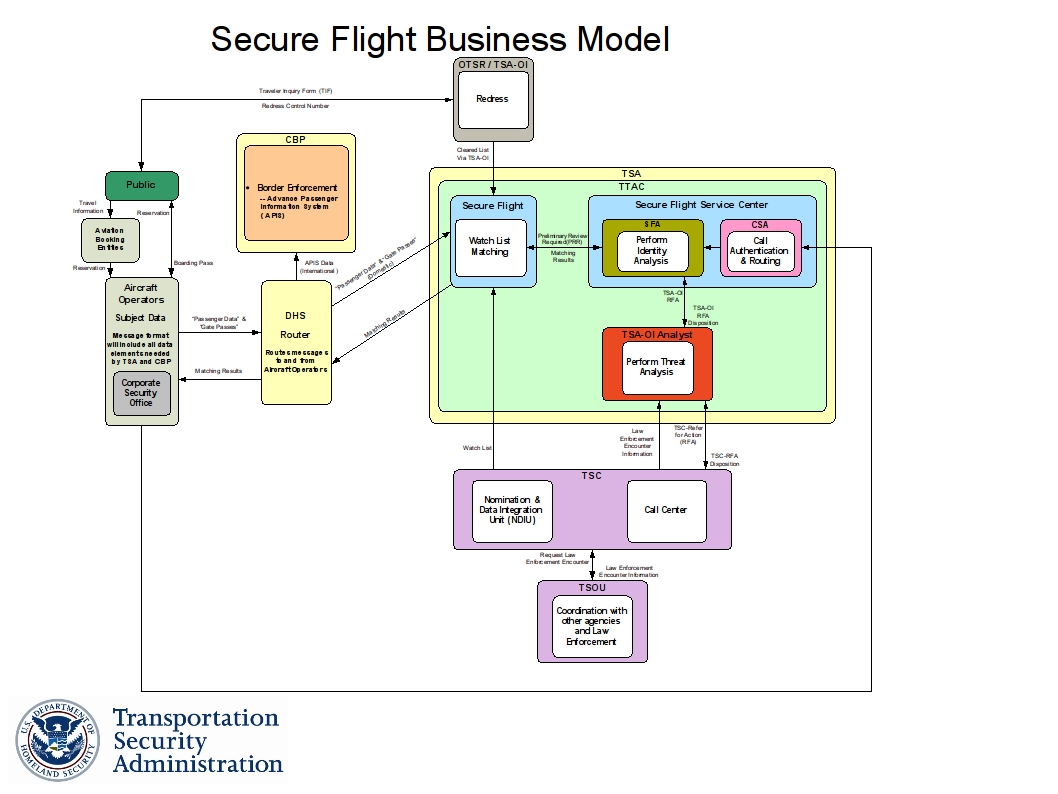 [“Secure Flight” process flow used by the TSA for airline passengers and being tested on Amtrak passengers. The red box at right center is the “black box” for algorithmic profiling, blacklist/blocklist enforcement, and fly/no-fly decision making.]
[“Secure Flight” process flow used by the TSA for airline passengers and being tested on Amtrak passengers. The red box at right center is the “black box” for algorithmic profiling, blacklist/blocklist enforcement, and fly/no-fly decision making.]
Amtrak has reportedly given the Transportation Security Administration several months of archives of Amtrak passenger reservations and frequent rider profiles. At Amtrak’s request, the TSA has used these records to test the TSA’s ability to extend to Amtrak passengers the ID-based profiling and blacklisting algorithms the TSA already applies to air travelers.
If you aren’t allowed to travel by air, the right to travel by train is critical. And while all common carriers have an obligation to transport all would-be passengers, Amtrak as a government agency should be most strictly held to that obligation.
The plans to run a batch of historical Amtrak reservations through the TSA’s “threat assessment” black box were disclosed in a Privacy Impact Assessment (PIA) quietly posted on the Department of Homeland Security website last December, and first noted in a news report by Mark Albert of Hearst Television earlier this week.
The PIA posted by the TSA in December 2021 said that Amtrak would give notice of the batch transfer of reservation archives to the TSA through an update to Amtrak’s privacy policy. That policy was last updated in November 2021, and doesn’t mention data sharing with the TSA. But a follow-up report today by Hearst Television quotes the TSA as saying that, “The collection of data and analysis has already occurred,” without the promised notice in Amtrak’s privacy policy.
What will this TSA’s test of Amtrak passenger profiling reveal? Of course some of the people who aren’t allowed to travel by air travel by train or bus instead. Amtrak and Greyhound are the long-distance carriers of last resort for undocumented and blacklisted travelers. So it’s to be expected that the TSA will find a disproportionate percentage of the people it has blacklisted from air travel on Amtrak passenger manifests.
Even more people will be forced to take Amtrak or Greyhound instead of flying if the TSA — as it has threatened — starts preventing people from flying if they don’t have, or don’t show, any ID, or ID the TSA deems to be compliant ID with the REAL-ID Act.
Does this mean that would-be terrorists are riding Amtrak trains? No. It means only that people blacklisted from air travel are riding trains. So far as we know, there have been no terrorist attacks on Amtrak trains. The false positives generated by the TSA’s “threat assessment” algorithms and precogs are evidence of what’s wrong with predictive profiling and why the right to travel by common carrier is so important.
The TSA and DHS have long wanted to extend their prior restraint of travel from airline passengers to all modes of travel including trains and buses, but have lacked any legal basis to do so. Amtrak’s sharing of reservation data with the DHS, even for passengers on international trains, has been represented as a “voluntary” action by Amtrak.
In the absence of any notice from Amtrak, it’s unclear what Amtrak claims as the legal basis for the recent “test” of TSA profiling of passengers on domestic Amtrak trains. Read More →
